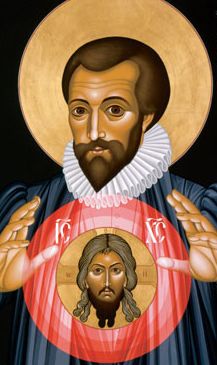 Our church Kalendar commemorates on March 31st the Very Reverend John Donne, Dean of St. Paul’s Cathedral in the early 17th Century. Raised in a Roman Catholic family, in his youth he was a libertine, soldier, courtier, and poet. He became an Anglican and eventually was ordained a priest. Before ordination he wrote a series of poems called “Holy Sonnets.” Later in life, while bedridden for some months with an illness for which there was no sure cure—it may have been typhus—Donne wrote about his experience of convalescence in a series of meditations called “Devotions Upon Emergent Occasions.” His language is magnificent and his understanding of Christian life is fundamental. Even though his words are old fashioned they still speak to us today. Here are excerpts from his fourteenth Holy Sonnet, in which he addresses the closeness of our union with Jesus: “Wilt thou love God as he thee? then digest, My soul, this wholesome meditation, How God the Spirit, by angels waited on In heaven, doth make His temple in thy breast. The Father having begot a Son most blest, And still begetting—for he ne'er begun— Hath deign'd to choose thee by adoption, Co-heir to His glory, and Sabbath' endless rest.” 'Twas much, that man was made like God before, But, that God should be made like man, much more. Here are excerpts from his seventeenth Meditation—the famous “no man is an island” text—in which he addresses the closeness of our union with fellow humans: “…The Church is Catholic, universal, so are all Her actions; all that She does belongs to all. When She baptizes a child, that action concerns me; for that child is thereby connected to that Body which is my head too, and in-grafted into that Body whereof I am a member. And when She buries a man, that action concerns me: all mankind is of one author, and is one volume. …No man is an island, entire of itself; every man is a piece of the continent, a part of the main. If a clod be washed away by the sea, Europe is the less, as well as if a promontory were …any man’s death diminishes me, because I am involved in mankind, and therefore never send to know for whom the bell tolls; it tolls for thee.” In the ecosystem of divine love God reaches out to us in love and as it dwells in us we become able to return our love to God and extend it to our neighbor. This is what Donne came to know in the depths of his being. His illness, while separating him from others did not lessen his concern for them—it drew him closer to them in fellow feeling. Nor did his troubles lessen his love for God, but drew him closer to God. As we confront now what he did then— sickness for which there is presently no sure cure—we can take to heart his example of life and teaching. I am sure that as he wrote he kept in mind the words of St. Paul: “I am convinced that neither death, nor life, nor angels, nor rulers, nor things present, nor things to come, nor powers, nor height, nor depth, nor anything else in all creation, will be able to separate us from the love of God in Christ Jesus our Lord.” (Romans 8. 38-39) News flash—Last week, the Chinese manufacturing company Xiaomi sent tens of thousands of face masks to the Italian government, with the following label on the shipping boxes, a quote from the Roman philosopher Seneca: “We are waves of the same sea, leaves of the same tree, flowers of the same garden.”
0 Comments
Leave a Reply. |
Archives
May 2021
authorsThe Rev. Charles Hoffacker is a retired priest of the Diocese of Washington |
 RSS Feed
RSS Feed
